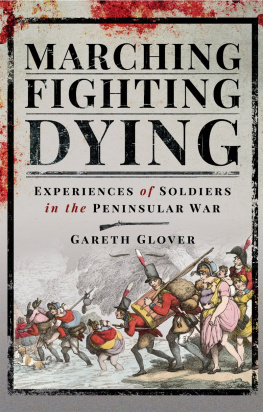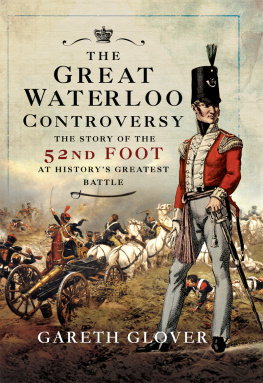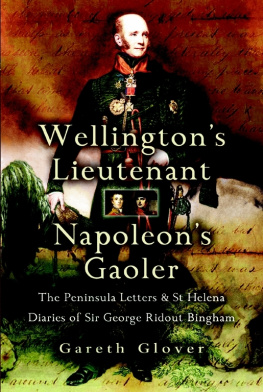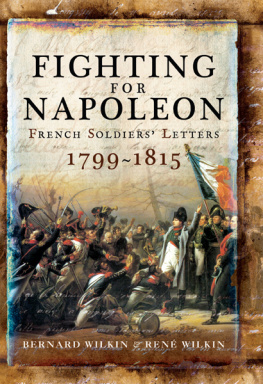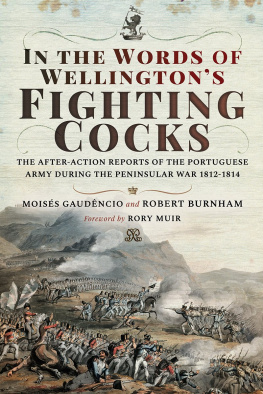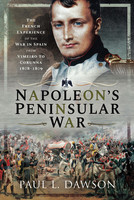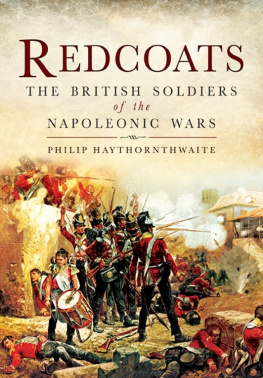Pagebreaks of the print version

Marching, Fighting, Dying
Marching, Fighting, Dying
Experiences of Soldiers in the Peninsular War
Gareth Glover
First published in Great Britain in 2021 by
PEN & SWORD MILITARY
An imprint of
Pen & Sword Books Ltd
Yorkshire Philadelphia
Copyright Gareth Glover 2021
ISBN 978 1 52676 022 7
eISBN 978 1 52676 023 4
The right of Gareth Glover to be identified as Author of this work has been asserted by him in accordance with the Copyright, Designs and Patents Act 1988.
A CIP catalogue record for this book is available from the British Library
All rights reserved. No part of this book may be reproduced or transmitted in any form or by any means, electronic or mechanical including photocopying, recording or by any information storage and retrieval system, without permission from the Publisher in writing.
Pen & Sword Books Ltd incorporates the imprints of Pen & Sword Archaeology, Atlas, Aviation, Battleground, Discovery, Family History, History, Maritime, Military, Naval, Politics, Social History, Transport, True Crime, Claymore Press, Frontline Books, Praetorian Press, Seaforth Publishing and White Owl For a complete list of Pen & Sword titles please contact
PEN & SWORD BOOKS LTD
47 Church Street, Barnsley, South Yorkshire, S70 2AS, England
E-mail:
Website: www.pen-and-sword.co.uk
Or
PEN AND SWORD BOOKS
1950 Lawrence Rd, Havertown, PA 19083, USA
E-mail:
Website: www.penandswordbooks.com
List of Illustrations
Preface
A huge number of books have been published over the last two centuries on Wellingtons army during the seven-year campaign in the Iberian Peninsula. Some of these works have been ground-breaking, utilizing significant original archival research to produce in-depth analysis which challenges our preconceptions and long-held beliefs. Unfortunately, however, these are still quite rare, while far too many simply repackage and regurgitate the same tired old clichs and use the same tried and trusted published sources, bringing little more to our understanding.
Many of these volumes have understandably concentrated on the strategies used (both at high and low level), the political maelstrom the war engendered and, of course, in-depth analysis of all of the individual campaigns, battles and sieges. Alongside these, there have also been a plethora of titles dealing with the uniforms worn and equipment used by the different armies, the logistical problems encountered in feeding large armies in the peninsula and even the influence of sea power on the campaign.
One aspect regularly explored within such works, is the analysis of the life of an ordinary soldier during these extremely hard campaigns. Previous titles on this particular subject, include Charles Omans Wellingtons Army 1809-14 , Alongside these works, many general histories of the campaigns and specific regimental studies often dip their toe into this subject area, as part of their overview of the campaign, but are usually little more than derivatives of these major works. However, all of these worthy titles suffer from the same single major flaw and it is the specific intention of the present volume to right this serious error.
There is an erroneous belief that literacy rates in Britain were very low in the early decades of the nineteenth century. In fact, literacy rates in Britain between 1750 and the early 1800s remained pretty constant at some 53 per cent of the adult population, but this generalized figure hides the true picture. In fact, male literacy rates regularly hovered around 60 per cent, whilst women saw a slow rise from a low of 30 per cent up to 40 per cent during this period and the gender gap continued to shrink until the 1880s, when it finally closed with both genders seeing literacy rates into the high 80 per cents.
It is also presumed that both the Army and Navy were generally filled from the very lowest strata of society and therefore literacy rates were markedly lower within the armed forces than in the general population. There may well be a grain of truth in this assertion, but it can be shown that literacy rates within the armed forces was not as low as many would have us believe. The notion that the Army was simply full of the dregs of society and that very few in the ranks were literate is not only an outdated assertion, but is demonstrably wrong, although it is still strongly believed by many to this day. In fact, only around 5 per cent of recruits failed to sign their form (marking with an X instead) or record a previous trade of any description, although the catch-all profession of labourer, which accounted for around 40 per cent of recruits, would clearly include a large number of unskilled workers, particularly agricultural labourers, with a low educational and literacy attainment. However, as the war progressed and economic hardships bit harder, the number of recruits from trades, particularly weavers from the hard-hit textile trade (hand weavers in Stockport saw wages decline from 25 shillings per week in 1802 to only 10 shillings in 1811), grew very significantly and therefore the educational standards of the average recruit rose with it.
A second, but significant, factor in the steady rise in levels of literacy in the Army was the rise of religious Nonconformism, believing in individual Bible study, which of course encouraged converts to become more literate. Many senior officers, including the Duke of Wellington, were initially wary of the steadily-increasing number of prayer meetings and Bible study groups which were sprouting up within the Army, based on the fear that these soldiers would be less inclined to fight. However, experience showed this to be a fallacy and
This steady increase in overall literacy levels becomes significant during the 23 years of global war that was fought from 1793 almost without intermission until 1815, because of the very significant rise in the number of letters, journals and memoirs available to the researcher. The volume of social correspondence noticeably increases with each year of the war, but not simply within the better-educated officer class and non-commissioned officers, who were required to be literate to carry out their role fully, including completing written returns. There is also an admittedly smaller, but rapidly increasing, volume of personal correspondence from ordinary rankers as the war progresses and more is undoubtedly yet to be unearthed, as all the available archives are still yet to be searched thoroughly.
Even while the war continued, a few sets of letters were published from individuals serving in the Army, whilst journal-keeping on campaign almost became the height of fashion for officers. This however was less common for non-commissioned officers and virtually unknown for those in the ranks.
However, after the Great War as the Napoleonic Wars were known to Victorian Britain there grew an insatiable public hunger for reminiscences of soldiers who had fought in the war, which graphically described not only the valour and bravery of battle, but also the hardships of long marches under a broiling sun and the terrible living conditions and hunger that they had often endured. Indeed, the genre is not unknown in our own times, with a public fascination still obvious for memoirs of those who fought in both World Wars and more modern conflicts.
This encouraged many ex-soldiers to dust off their old journals written during the conflict, or they simply wrote down whatever they could vaguely recall of events which happened decades before. However, such a competitive market, with its constant demands for ever-greater revelations, forced them to seek to bring more excitement to their stories. Unfortunately, the experience of war for most people is truly stated as long periods of boredom punctuated by short moments of excitement. Indeed, the use of the term Adventures in their titles should always cause the historian to check their claims thoroughly. These memoirs should therefore be treated as suspect and must be used with extreme caution, fully understanding that their trials and tribulations will be heightened for pathos and their descriptions of battles and sieges fully exploit the readers eager desire to read of valour, bravery and derring-do.

